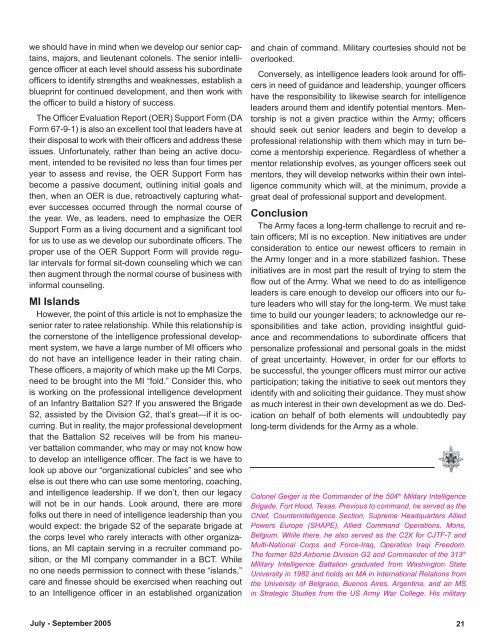Military Intelligence Professional Bulletin - Federation of American ...
Military Intelligence Professional Bulletin - Federation of American ...
Military Intelligence Professional Bulletin - Federation of American ...
Create successful ePaper yourself
Turn your PDF publications into a flip-book with our unique Google optimized e-Paper software.
we should have in mind when we develop our senior captains,<br />
majors, and lieutenant colonels. The senior intelligence<br />
<strong>of</strong>ficer at each level should assess his subordinate<br />
<strong>of</strong>ficers to identify strengths and weaknesses, establish a<br />
blueprint for continued development, and then work with<br />
the <strong>of</strong>ficer to build a history <strong>of</strong> success.<br />
The Officer Evaluation Report (OER) Support Form (DA<br />
Form 67-9-1) is also an excellent tool that leaders have at<br />
their disposal to work with their <strong>of</strong>ficers and address these<br />
issues. Unfortunately, rather than being an active document,<br />
intended to be revisited no less than four times per<br />
year to assess and revise, the OER Support Form has<br />
become a passive document, outlining initial goals and<br />
then, when an OER is due, retroactively capturing whatever<br />
successes occurred through the normal course <strong>of</strong><br />
the year. We, as leaders, need to emphasize the OER<br />
Support Form as a living document and a significant tool<br />
for us to use as we develop our subordinate <strong>of</strong>ficers. The<br />
proper use <strong>of</strong> the OER Support Form will provide regular<br />
intervals for formal sit-down counseling which we can<br />
then augment through the normal course <strong>of</strong> business with<br />
informal counseling.<br />
MI Islands<br />
However, the point <strong>of</strong> this article is not to emphasize the<br />
senior rater to ratee relationship. While this relationship is<br />
the cornerstone <strong>of</strong> the intelligence pr<strong>of</strong>essional development<br />
system, we have a large number <strong>of</strong> MI <strong>of</strong>ficers who<br />
do not have an intelligence leader in their rating chain.<br />
These <strong>of</strong>ficers, a majority <strong>of</strong> which make up the MI Corps,<br />
need to be brought into the MI “fold.” Consider this, who<br />
is working on the pr<strong>of</strong>essional intelligence development<br />
<strong>of</strong> an Infantry Battalion S2? If you answered the Brigade<br />
S2, assisted by the Division G2, that’s great—if it is occurring.<br />
But in reality, the major pr<strong>of</strong>essional development<br />
that the Battalion S2 receives will be from his maneuver<br />
battalion commander, who may or may not know how<br />
to develop an intelligence <strong>of</strong>ficer. The fact is we have to<br />
look up above our “organizational cubicles” and see who<br />
else is out there who can use some mentoring, coaching,<br />
and intelligence leadership. If we don’t, then our legacy<br />
will not be in our hands. Look around, there are more<br />
folks out there in need <strong>of</strong> intelligence leadership than you<br />
would expect: the brigade S2 <strong>of</strong> the separate brigade at<br />
the corps level who rarely interacts with other organizations,<br />
an MI captain serving in a recruiter command position,<br />
or the MI company commander in a BCT. While<br />
no one needs permission to connect with these “islands,”<br />
care and finesse should be exercised when reaching out<br />
to an <strong>Intelligence</strong> <strong>of</strong>ficer in an established organization<br />
and chain <strong>of</strong> command. <strong>Military</strong> courtesies should not be<br />
overlooked.<br />
Conversely, as intelligence leaders look around for <strong>of</strong>ficers<br />
in need <strong>of</strong> guidance and leadership, younger <strong>of</strong>ficers<br />
have the responsibility to likewise search for intelligence<br />
leaders around them and identify potential mentors. Mentorship<br />
is not a given practice within the Army; <strong>of</strong>ficers<br />
should seek out senior leaders and begin to develop a<br />
pr<strong>of</strong>essional relationship with them which may in turn become<br />
a mentorship experience. Regardless <strong>of</strong> whether a<br />
mentor relationship evolves, as younger <strong>of</strong>ficers seek out<br />
mentors, they will develop networks within their own intelligence<br />
community which will, at the minimum, provide a<br />
great deal <strong>of</strong> pr<strong>of</strong>essional support and development.<br />
Conclusion<br />
The Army faces a long-term challenge to recruit and retain<br />
<strong>of</strong>ficers; MI is no exception. New initiatives are under<br />
consideration to entice our newest <strong>of</strong>ficers to remain in<br />
the Army longer and in a more stabilized fashion. These<br />
initiatives are in most part the result <strong>of</strong> trying to stem the<br />
flow out <strong>of</strong> the Army. What we need to do as intelligence<br />
leaders is care enough to develop our <strong>of</strong>ficers into our future<br />
leaders who will stay for the long-term. We must take<br />
time to build our younger leaders; to acknowledge our responsibilities<br />
and take action, providing insightful guidance<br />
and recommendations to subordinate <strong>of</strong>ficers that<br />
personalize pr<strong>of</strong>essional and personal goals in the midst<br />
<strong>of</strong> great uncertainty. However, in order for our efforts to<br />
be successful, the younger <strong>of</strong>ficers must mirror our active<br />
participation; taking the initiative to seek out mentors they<br />
identify with and soliciting their guidance. They must show<br />
as much interest in their own development as we do. Dedication<br />
on behalf <strong>of</strong> both elements will undoubtedly pay<br />
long-term dividends for the Army as a whole.<br />
Colonel Geiger is the Commander <strong>of</strong> the 504 th <strong>Military</strong> <strong>Intelligence</strong><br />
Brigade, Fort Hood, Texas. Previous to command, he served as the<br />
Chief, Counterintelligence Section, Supreme Headquarters Allied<br />
Powers Europe (SHAPE), Allied Command Operations, Mons,<br />
Belgium. While there, he also served as the C2X for CJTF-7 and<br />
Multi-National Corps and Force-Iraq, Operation Iraqi Freedom.<br />
The former 82d Airborne Division G2 and Commander <strong>of</strong> the 313 th<br />
<strong>Military</strong> <strong>Intelligence</strong> Battalion graduated from Washington State<br />
University in 1982 and holds an MA in International Relations from<br />
the University <strong>of</strong> Belgrano, Buenos Aires, Argentina, and an MS<br />
in Strategic Studies from the US Army War College. His military<br />
July - September 2005 21
















